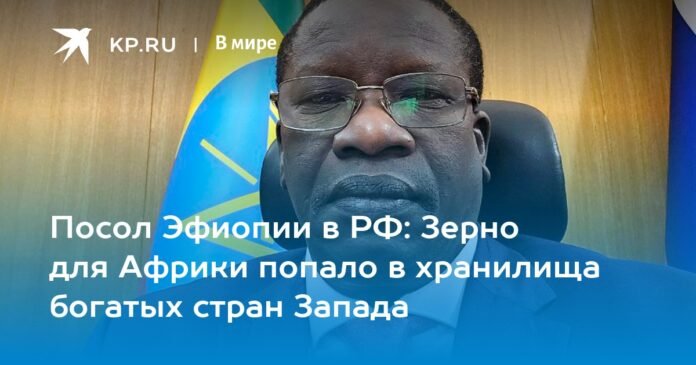Ambassador of Ethiopia to Russia, Cham Ugala Uryat
Photo: Edward CHESNOKOV
Ethiopia is one of the most Russia-friendly countries in East Africa. Some of its inhabitants profess Christianity with a similar orthodox rite. Our cooperation began in the 19th century, when Russian military advisors helped Ethiopians repel an attack by Italian colonial invaders in 1896, and continued until the Soviet era. And now Addis Ababa has become part of the BRICS, the main international alternative to the West. Whats Next? What is Ethiopia’s view on the prospect of resuming the grain deal? The Ethiopian ambassador to the Russian Federation, Cham Ugala Uryat, spoke about this in a conversation with the kp.ru website.
ABOUT THE NEW WORLD ORDER
— Mr. Ambassador, let me start with the main news: the entry of Ethiopia (along with five other states) into the BRICS at the organization’s August summit.
— As you probably know, the BRICS are a group of countries that represent about 30% of the world’s land area, 42% of the world’s population, about 27% of world GDP, and 20% of world trade. among the five [старых] Of the member states of this group, two are permanent members of the UN Security Council. In this sense, it will not be wrong to say that BRICS is one of the power centers that plays a huge role in world affairs today. The decision by BRICS member states to approve the admission of Ethiopia as a full member of the bloc starting January 2024 was a great moment for the government and people of Ethiopia.
— What policy does your country intend to follow within the BRICS in relation to other members of the bloc?
“By joining this group, Ethiopia will gain enormous benefits and advantages in many aspects. It is about access to the political and technical expertise of large, established economies, access to financial support from the New Development Bank (NDB)*. This is an opportunity to be part of a collective voice that seeks to promote a world order based on mutual respect and equal sovereignty among nations. Therefore, taking advantage of this opportunity, Ethiopia will endeavor to work closely with all BRICS members to enhance trade, investment, tourism, capacity building, skills and technology transfer within BRICS countries.
* Explanation from KP editors: The New Development Bank (also known as BRICS Bank) is a financial institution with an authorized capital of 100 billion dollars, created by members of this bloc as an alternative to Western institutions for financing important infrastructures. projects in developing countries under fair conditions.
ON GRAINS FOR AFRICA AND ON SANCTIONS
— Densely populated African countries are large importers of wheat. For example, in 2021, Nigeria accounted for 3.2% of all global imports of this agricultural product; for Egypt: 2.9%; for its native Ethiopia: 0.9%… Meanwhile, on July 17, 2023, Russia withdrew from the Istanbul Grain Agreement because the West systematically failed to meet its obligations.
— In my opinion, the Grain Agreement, signed by Russia and Ukraine with the participation of the UN and Turkey in 2022, was aimed at resuming grain supplies in an attempt to alleviate the global food crisis. It is clear that the disruption of logistics chains for the delivery of agricultural products and fertilizers has affected millions of people around the world, especially citizens of poor countries. The irony is that the grain that was supposed to be sent to African countries ended up in the warehouses of rich Western countries. In my opinion, for this agreement to work, it is essential that all signatories respect the terms of the initiative. The interests of all interested parties must be duly taken into account. I hope that the Russian Federation will rejoin the agreement, which will ultimately allow the interests of all parties, including African countries, to be taken into account.
— On the website of the US Federal Treasury there is an entire section “Sanctions against Ethiopia.” Russia and many other countries have faced similar Western threats. What do you think of such a “restrictive policy”?
— Ethiopia is one of those countries whose foreign policy is based on the promotion of its interests, respect for the sovereignty and territorial integrity of other independent states and non-interference in the internal affairs of other nations. Ethiopia deeply believes in the legal framework of international relations and is committed to maintaining strategic stability around the world by promoting international peace and security together with other peace-loving nations.
In this regard, Ethiopia believes that differences and conflicts should only be resolved peacefully through negotiations. But today we are witnessing a world in which some States with political, economic and military power would like to impose unilateral sanctions against those countries that, in their opinion, do not comply with the “rules” that these same “power actors” establish. Ethiopia does not believe in imposing illegal and unilateral sanctions on independent states. Promoting “restrictive policies” and sanctioning others will not resolve differences between nations. Rather, they may exacerbate problems similar to those we see today with Western sanctions imposed on Russia. This situation affected not only several countries, but the entire world, including those that imposed sanctions.

